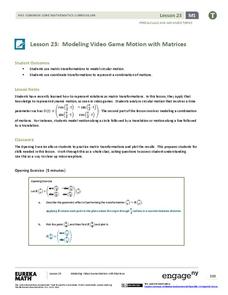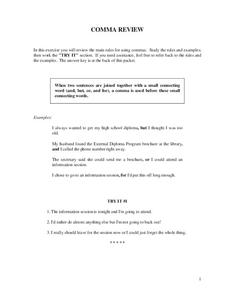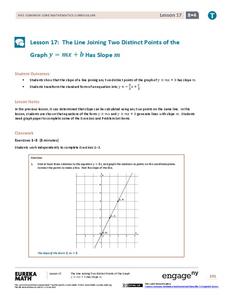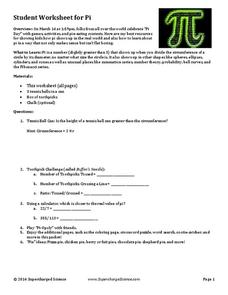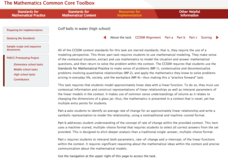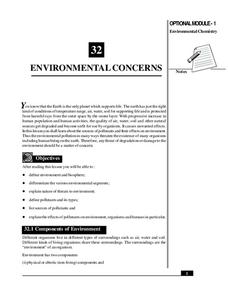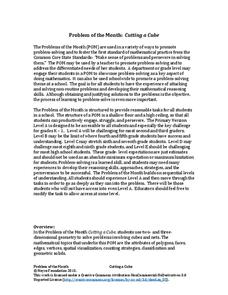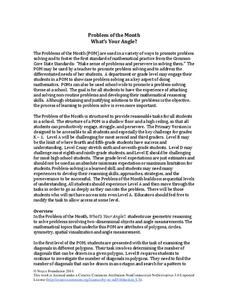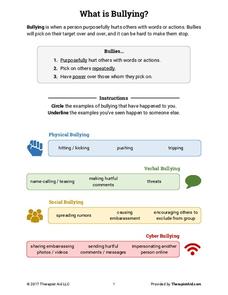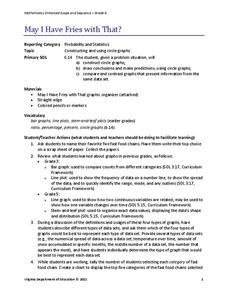EngageNY
Modeling Video Game Motion with Matrices 2
The second day of a two-part lesson on motion introduces the class to circular motion. Pupils learn how to incorporate a time parameter into the rotational matrix transformations they already know. The 24th installment in the 32-part...
National External Diploma Program Council
Capitalization Review
Using correct grammar is a capital idea! Elementary readers review the rules of capitalization, including proper nouns, abbreviations of organizations, and holidays, before correcting the errors in two sets of sentences.
National Security Agency
Multiple Representations of Limits
After an introductory activity to demonstrate the theory of a limit, additional activities approach a limit from graphical, numerical, and algebraic methods. The activity looks at the multiple ways of understanding and evaluating a limit.
National External Diploma Program Council
Comma Review One
Commas are helpful for separating names of cities from states, setting off interjections, and listing items in a series. Practice the many uses of commas with a set of grammar exercises designed for both elementary and middle school...
TryEngineering
Graphics: Bits and Points
What can a mural teach pupils about computer science? The lesson has scholars create a mural on a wall to learn about bitmap and vector graphics. Along the way, they learn about the graphics coordinate system.
TryEngineering
Program Your Own Game
Young computer scientists get to see what it's like to be a software engineer as they use free online software to design a computer game. They play and evaluate games groups created to round out the activity.
Davis School District
Computer Parts
What is inside a computer? Give your budding computer scientists a worksheet that has them label parts of a computer. They use a link included on the sheet to label basic input/output systems, video cards, drives, case fan, and more....
Illustrative Mathematics
Modeling London's Population
Looking at London's population from 1801–1961 in 20 year increments, high school mathematicians determine if the data can be modeled by a given logistic growth equation. They explain their thinking and determine the values of each...
EngageNY
The Line Joining Two Distinct Points of the Graph y=mx+b Has Slope m
Investigate the relationship between the slope-intercept form and the slope of the graph. The lesson plan leads an investigation of the slope-intercept equation of a line and its slope. Pupils realize the slope is the same as the...
Mathwire
Shamrock Paths
What could St. Patrick's Day and Pascal's triangle possibly have in common? Trace the pattern in a holiday-themed activity that prompts learners to find the word shamrock as many times as they can.
Curated OER
Worksheet for Pi
Who needs a pie-eating contest when you have a pi-ology game! Celebrate March 14th with a fun board game about pi and other geometric concepts. As learners answer questions about geometry, they move around the board to collect tokens.
Mathematics Common Core Toolbox
Golf Balls in Water
Here's a resource that models rising water levels with a linear function. The task contains three parts about the level of water in a cylinder in relationship to the number of golf balls placed in it. Class members analyze the data and...
National Institute of Open Schooling
Environmental Concerns
Every year, more than 14 billion pounds of garbage is dumped into the oceans of the world, most of which is plastic and toxic to ocean life. Lesson 32 in the series of 36 focuses on environmental concerns, specifically pollution. Under...
Noyce Foundation
Cutting a Cube
Teach the ins and outs of the cube! A series of five K–12 level activities explore the make-up of the cube. The beginning lessons focus on the vocabulary related to the cube. Later lessons explore the possible nets that describe a cube....
Noyce Foundation
The Wheel Shop
Teach solving for unknowns through a problem-solving approach. The grouping of five lessons progresses from finding an unknown through simple reasoning to solving simultaneous equations involving three and four variables. Each lesson...
Noyce Foundation
What's Your Angle?
Math can be a work of art! Reach your artistic pupils as they explore angle measures. A creative set of five problems of varying levels has young learners study interior and exterior angle measures of polygons. The introductory levels...
Noyce Foundation
Movin 'n Groovin
Examine the consequences of varying speed. An engaging set of five problem sets challenges young mathematicians by targeting a different grade level from K-12. In the initial lesson, scholars make conclusions about the time it takes two...
Therapist Aid
What is Bullying?
What is the definition of bullying, and how can you deal with it? Elementary and middle schoolers discuss verbal, physical, social, and cyberbullying before talking about strategies to avoid and stop bullying in their school.
California Education Partners
Eleven
It is difficult to articulate how growing up feels as accurately and beautifully as Sandra Cisneros does in her short story "Eleven." After seventh graders read the story and note the author's use of figurative language, they respond to...
K5 Learning
George Washington and His Hatchet
America has a long history of presidents with an affinity for the truth, from Honest Abe to George Washington and his cherry tree. A short passage features Washington's infamous hatchet and confession, and includes four comprehension...
American Physiological Society
Did I Observe it or Infer it?
Take the mystery out of inquiry! When young scientists learn to use their keen powers of observation to make smart inferences about a situation, they are well on their way to understanding what the scientific method is all about. Using...
Virginia Department of Education
May I Have Fries with That?
Not all pie graphs are about pies. The class conducts a survey on favorite fast food categories in a lesson on data representation. Pupils use the results to create a circle graph.
K5 Learning
Hide and Seek
Hide and seek is a lot of fun whether you're the hider or the seeker! Second graders read a short passage about a game of hide and seek before answering four reading questions.
K5 Learning
One of Aesop's Fables
It's one thing to have an idea, but someone has to put it into action! Young pupils read a rendition of Aesop's fable of the mice in the council before answering four questions about details from the text.
Other popular searches
- Research Projects
- School Projects
- Halloween Art Projects
- Algebra Projects
- Language Arts School Projects
- Black History Month Projects
- Sports Marketing Projects
- Environment Research Projects
- Dr. Seuss Art Projects
- Science Fair Projects
- Physical Science Projects
- High School Algebra Projects


